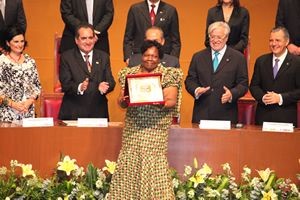
UN-Habitat on Monday kicked off the search for this year’s winner of the world’s most prestigious human settlements award.
The agency’s Executive Director Dr. Joan Clos announced the call for entries for the award, winners of which are expected to be announced on World Habitat Day on 7 October 2013, while the Award presentation ceremony will be held during the closing of the Seventh Session of the World Urban Forum, to be held in Medellin, Colombia, on 11 April 2014.
“Individuals, organisations, initiatives and projects are eligible to be nominated for their achievements and best practices in innovation, impact and sustainability in the following areas: urban legislation, land and governance; urban planning and design; urban economy; urban basic services, housing and slum upgrading; risk reduction and rehabilitation; and urban research and capacity development,” Dr. Clos said in his statement.
The UN-Habitat Scroll of Honour award was launched by the United Nations Human Settlements Programme in 1989. It is currently the most prestigious human settlements award in the world. Its aim is to acknowledge initiatives which have made outstanding contributions in various fields such as shelter provision, highlighting the plight of the homeless, leadership in post conflict reconstruction and developing and improving human settlements and the quality of urban life.
The award, a plaque engraved with the name of the winner and their achievement, is presented to the winners during the World Urban Forum.
“In previous years, we have received submissions describing an array of impressive initiatives to improve shelter and urban services. The deadline for submitting entries to the 2013 UN-Habitat Scroll of Honour is 16 September 2013,” Dr. Clos said.
According to the Executive Director those eligible for consideration for the Award are: Individuals, organizations, projects and any Habitat Agenda partner can be nominated for the Habitat Scroll of Honour. These include:
- Government and inter-governmental organizations or agencies, including bilateral aid agencies
- Cities, local authorities or their associations
- Civil society organizations
- The private sector
- National Habitat Committees or focal points
- Research and academic institutions
- Public or private foundations
- Multilateral agencies (United Nations Agencies, World Bank, etc.)
- The media
- Individuals
Source: UN Habitat










